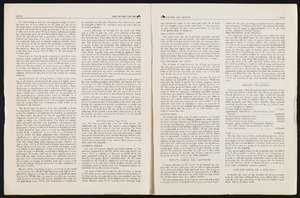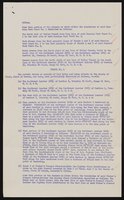Search the Special Collections and Archives Portal
Search Results
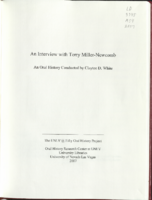
Transcript of interview with Terry Miller-Newcomb by Claytee D. White, October 10, 2005
Date
Archival Collection
Description
Text
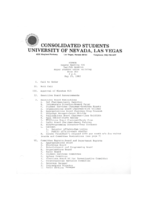
Meeting minutes for Consolidated Student Senate, University of Nevada, Las Vegas, May 25, 1982
Date
Archival Collection
Description
Text
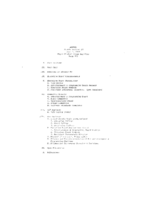
Meeting minutes for Consolidated Student Senate, University of Nevada, Las Vegas, June 5, 1979
Date
Archival Collection
Description
Text
Penelope Ruchman Collection of Las Vegas, Nevada Casino Professionals Oral Histories
Identifier
Abstract
The Penelope Ruchman Collection of Las Vegas, Nevada Casino Professionals Oral Histories includes interviews conducted by Ruchman from approximately 1999 to 2001 of casino industry workers who worked in Las Vegas, Nevada. The majority of interviews were conducted by Ruchman in their office at Gambler's Book Shop (GBS), but some where conducted in interviewee's homes and offices, or over the phone. The collection represents Ruchman's efforts to interview and document a generation of early casino industry workers that were quickly aging. The project was intended to be compiled as a definitive history of Las Vegas and American gambling, entitled "After the Gold Rush." The project was permanently postponed in the fall of 2001 when Ruchman left GBS to work for Park Place Entertainment as a corporate business and operations analyst, and later as casino operations director for Caesars Palace. Not all interviews have digital transcripts available.
Archival Collection
UNLV Libraries Collection of Players International, Inc. Financial and Research Reports
Identifier
Abstract
The UNLV Libraries Collection of Players International, Inc. Financial and Research Reports includes annual reports, financial reports, equity research reports, and prospectus for Players International, Inc. based in Calabasas, California, dating from 1993 to 1998.
Archival Collection
Mollie Gregory Collection of Oral Histories
Identifier
Abstract
The Mollie Gregory Collection of Oral Histories contains audio interviews and brief transcripts that focus on welfare, family, and women's issues in Nevada from 1970 to 1974. Gregory interviewed Nevada residents including Maya Miller, Ruby Duncan, and Mary Wesley, who described their lives during the anti-poverty and women's rights campaigns in the early 1970s. The collection documents views on welfare; the Equal Rights Amendment; race, discrimination, and civil rights; and political campaigns.
Archival Collection
International Food Service Executives Association Records
Identifier
Abstract
The International Food Service Executive Association (IFSEA) Records contain the organizational records from the IFSEA dating from 1916 to 2010. Included are meeting programs and minutes, menus, conference reports and proceedings, financial reports, newsletters, award certificates, scrapbooks, and stewards and caterers records focusing on the hospitality and food service industry. Materials are from both national and regional branches of the organization and include records from the United States military, with whom IFSEA has partnered with since the 1960s. Club artifacts and trophies are also contained in the collection.
Archival Collection

